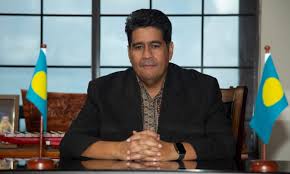The response to Palau’s digital residency programme has been much slower than expected. So far, 800 people have signed up since the programme went online in January.
Although well below the target, that number is passable for now, according to Palau President Surangel Whipps Jr. “We had zero and now we have 800. The goal is 7 billion, but we have got to start somewhere,” he said in a recent interview with RNZ Pacific.
The world’s first digital residency program has paved the way for Palau’s ambition to become a borderless financial hub that relies on blockchain and crypto technology. The digital residency costs US$248 per person.
“Part of building economic resilience means we need to diversify our economy. We need to look at other opportunities to help develop new types of business opportunities and economic growth,” Whipps said. “We have two fiber optic cables that we went into debt to bring to Palau.”
Interest from different regions
Palau’s US$30-million subsea cable, owned by the National Submarine Cable Utility Belau Submarine Cable Corp, connects the Pacific nation to Southeast Asia and the U.S mainland. Whipps said Palau must find businesses and development opportunities around this infrastructure. He visualised the digital residency programme as a portal for foreign investments “whether it is in the crypto space or any other type of FinTech.”
Whipps said Palau will eventually develop a corporate registry for companies that are headquartered in the country. “We know we are small, but we want to be able to look at those business opportunities and attract businesses that are operating in the region, especially in Asia,” he said, adding the new system will allow investors “to be able to transact business, whether it’s in cryptocurrency or in any other type of business.”
So far, Palau’s digital residency programme has drawn interest from different regions. “We have about a third from the Americas, we have a third from Asia and a third from Europe,” Whipps said. “So, it is a mix of people and that is what it was developed to be. We want to make the ecosystem so that we can attract citizens from all over the world.”
“Unlike passports, for example, any citizen of a country can get a passport. But under our digital residency programme, we have to do a background check on you,” Whipps said. “So, you’re selected and then it only lasts for a year. If there are bad activities that come up, you get taken off the programme.”
Crypto experts warn
But experts have warned that Palau’s bid to become a global hub for cryptocurrency could turn the nation into a “scammers’ paradise.”
“We are not interested in money laundering and bringing criminals in. We want to do it the right way because there is a lot of people around the world that want to participate in it,” Whipps said.
Acknowledging that “there are always risks,” Whipps underscored the need to calculate the programme’s implementation to mitigate any peril along the way. “That is why we’re not jumping in and changing everything at once. We are taking baby steps.”

2 Responses
Comments are closed.